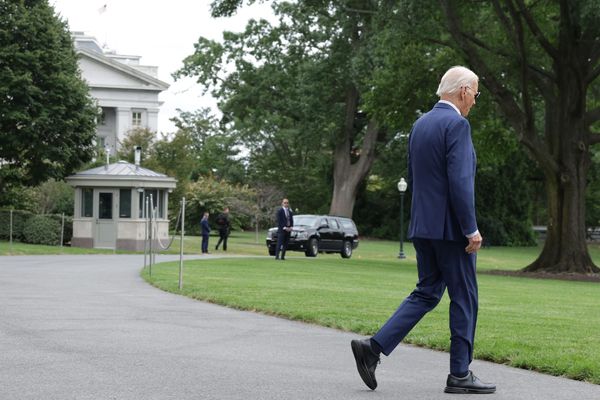
The No victory has put the wind in the sails of Peter Dutton and got commentators talking about the possibility of him winning government in 2025 without needing teal seats. And Dutton’s willingness to embrace division, grievance and victimhood and make politics about who you are against and how strongly you can be against them, may well prove a more effective political tactic than it did in 2022 when economic conditions were more benign. We’ll see.
Meanwhile, the United States is serving up a giant asterisk to all that in the form of the dysfunctionality of the congressional Republicans, who are so bitterly divided as to be unable to agree on a House speaker, after MAGA Republicans booted the last one — who was one of their own — out of the job.
The details are less important than the outcome, which has been the shutdown of one-half of the legislative branch of the US government. The fact that it was sparked by the willingness of the last speaker to do a deal with the Biden administration to keep the government from shutting down entirely illustrates that what is at stake here are two differing views of government.
One, a traditional conception of government as something that is necessary, and the utility of which can be maximised; the other, that the institutions of government are so debauched and corrupted by sinister elites that their being shut down is not collateral damage in a political battle with ideological opponents, but the point of the exercise.
The latter, nihilistic view of government emerges from the continuing impacts of neoliberalism — when governments operate in the interests of powerful corporate elites, trust in government, in their institutions, falls, and resentment of them rises. The conception of government as a vehicle for the public interest, not special interests, weakens. Moreover, the predominant ethos of neoliberalism is of government as the problem, always to be solved by disempowering it in the name of freedom.
Thus even the corporate elites, in whose interests government operates, insist publicly that government is the problem. That the alienated, the disgruntled, those who are struggling economically, take this to the extreme of conspiracies about global elites secretly controlling everything is inevitable.
But if you reject the idea of the possibility of good government, either because you’ve come to see all governments as a conspiracy, or you’ve drunk the corporate Kool-Aid about government always being the problem, the past decade has shown that it means you can’t govern. The Trump administration, and its continuing echoes in the GOP. The Johnson-Truss-Sunak rolling Tory disaster in the UK. The corrupt, incompetent Morrison government here, which operated essentially as a protection racket for Coalition donors and stumbled from stuff-up to stuff-up. And let’s not forget the disaster of the Abbott years.
Dutton’s own incompetence as a senior minister is the stuff of record now, especially his loss of control of our borders and his undermining of national security through the maladministration of the Home Affairs portfolio, the most bungling, error-prone department in the Commonwealth. As with Morrison and Abbott, Dutton was comfortable prosecuting culture wars and aggressively denouncing enemies, but the difficult stuff of governing well proved beyond him. Home Affairs was for looking after au pairs of former colleagues, not hard policy yakka.
What would be different now? As Abbott and Morrison have shown — indeed, most of our recent PMs have — you don’t get upgraded in your managerial and leadership abilities when you achieve high office. To suggest otherwise is to suggest MAGA Republicans will suddenly develop policy acumen and legislative brilliance, or that the Tories will fix the economic decline they have engineered in Britain.
This doesn’t make life easier for Anthony Albanese, however. Successful oppositions don’t have to be positive, as Abbott showed. Albanese has Clare O’Neil in Home Affairs and she has clearly rattled Dutton by unmasking his incompetence. But the prime minister’s longer-term goal is to convince people that government can work in the public interest, that competent government is not merely possible but should be expected.
While the Voice referendum was the fulfilment of an election promise and thus part of that agenda of reliable, trustworthy government, it’s also given the nihilists the opportunity to attack the very idea of competent government as a chimera. At the core of the No campaign — perhaps its most successful message — was that the nuance and detail and evidence that lies behind more effective Indigenous policies were not wrong, or flawed, but irrelevant; that the very idea of governing better was just another progressive delusion, just another elite myth to be dismissed as a joke.
As recent history tells us, that becomes a grim, self-reinforcing reality.







